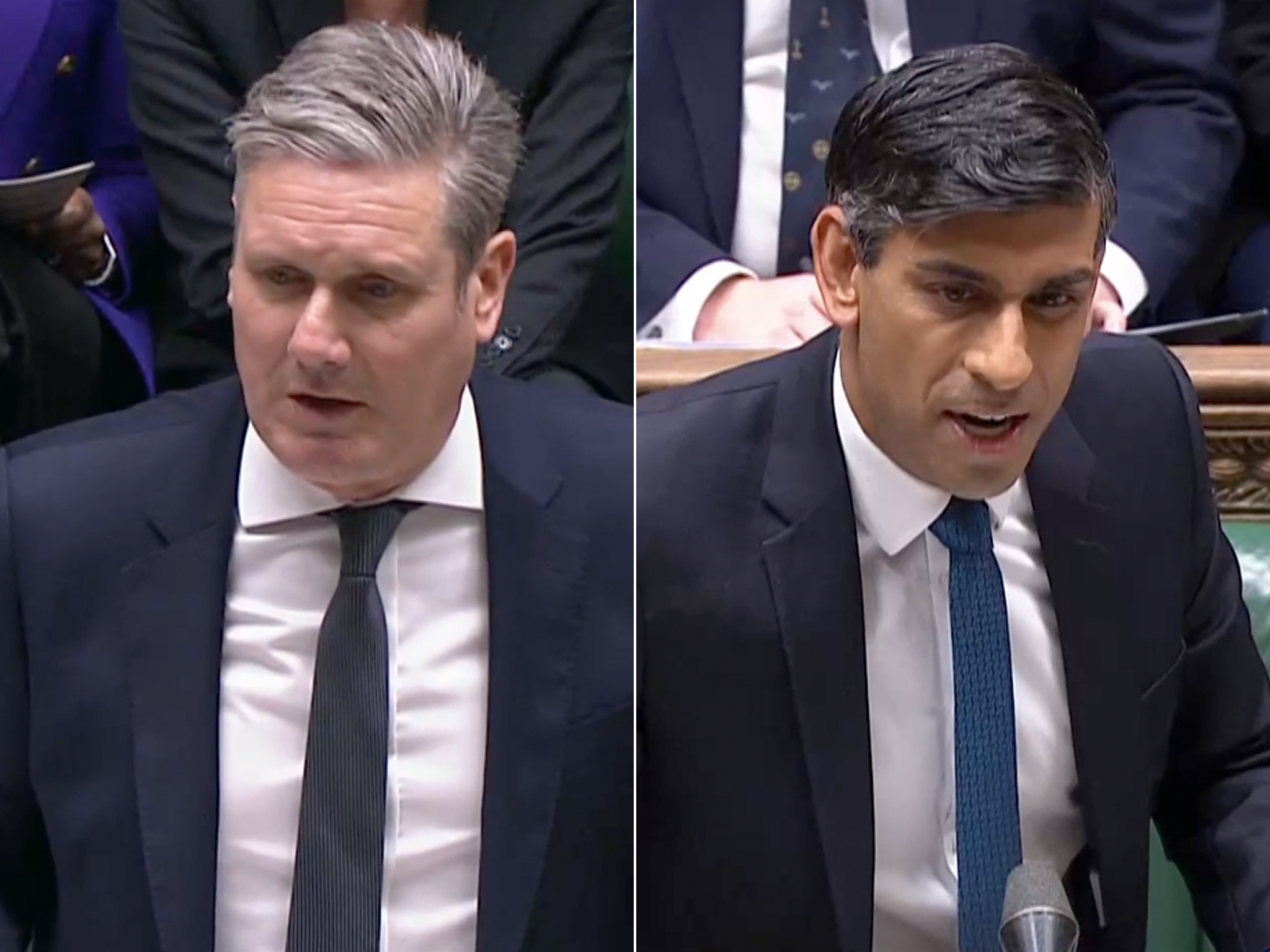Zealot, crank or loser? Sunak and Starmer are locked in an election eco-war
Rishi Sunak is trying to put some clear green water between him and the Labour Party, writes John Rentoul


At one level, the unexpected result in the Uxbridge by-election had nothing to do with policies on climate change. The ultra-low-emission zone (Ulez), which cost Labour the seat, is about local air quality, not net zero.
At another level, it was all about climate change. The vote – or enough of the vote to make a difference – was about the principle of paying for “green” objectives. It was seized on by net zero sceptics such as Lord Frost, Boris Johnson’s Brexit negotiator, as evidence that British voters, although they say they agree with the target of carbon neutrality by 2050, will cease to support it if there is a price to be paid.
The result was noted in Downing Street. On Monday, Rishi Sunak was asked if he stood by the plan to ban the sale of new petrol and diesel cars in 2030, one of the big intermediate targets between now and the middle of the century. He waffled about how “net zero is important to me”, which looked like an evasion but I don’t think it was meant to be.
I assume that what happened was that Sunak had decided, after the by-election, that the government’s approach to net zero needed to be “proportionate and pragmatic” and to avoid imposing “unfair” burdens on the people. This is what his official spokesperson said, as he tried to navigate the confusion created, not just by Sunak, but by Michael Gove, the housing secretary, who was asked about the 2030 deadline on Sunday, and Andrew Mitchell, the development minister, who had been on the Monday morning media round.
All three of them managed to sound as if the 2030 target was a dimly remembered hangover from Boris Johnson’s premiership, and as if they weren’t sure whether they were supposed to agree with it or not.
By this morning, Gove, who on Sunday said that he hadn’t looked at the policy for some time and didn’t know if it was still “credible”, now said that the policy stood and that the deadline was “immovable”.
This is the kind of muddle that happens only when parties try to make important policy adjustments without thinking them through. One moment the prime minister’s spokesperson was saying that all net zero policies were “under review”; the next Gove was saying that one of them wasn’t.
It happens when the prime minister is trying to tread a fine line, wanting to signal to the voters that he is all for greenery provided it doesn’t cost anything, but also trying to avoid being associated with the anti-net zero crowd, which would make him look like a crank and a loser.
And it happens when Sunak is trying to put some clear green water between him and the Labour Party. He wants to portray Starmer as an out-of-touch eco-zealot, while he gets on with the “proportionate and pragmatic” measures needed to salve the voters’ green consciences.
Sunak ought to be assisted in this by Labour’s own confusions. Starmer and Rachel Reeves, the shadow chancellor, are already on the run from their own green ambitions from the era of low interest rates, just two years ago. The £28bn-a-year Green Prosperity Plan has been kicked into the long green grass. Yet Labour is hoist by its leftover rhetoric, which holds that vast investment in the transition to a zero-carbon economy will pay for itself by creating hundreds of thousands of good, well-paid jobs and by making energy cheaper. If that were true, private investment would be pouring into green energy without any need for government subsidy.
Thus Starmer is still impaled on another intermediate target, that of decarbonising all UK electricity generation by 2030. The government’s target of ending the sale of new petrol- and diesel-only cars by that date is testing enough; 100 per cent clean electricity is close to impossible. If it could be achieved, it would only be at a cost that most voters regard as unacceptable.
Sunak has a chance of making the green issue work for him. He nearly fluffed it on Monday by making it look as if he harboured secret doubts about whether climate change is real, which would be fatal to any leader aspiring to become or to remain prime minister. But if he can scare the voters with the huge costs of Starmer’s plans, he could start to claw back some of Labour’s opinion-poll lead.
This will be an intricate struggle over the next 12 months. Sunak will try to position the government on the lower-cost side of a narrow strip of green water dividing him from the “unrealistic” ambitions of a Labour Party still in thrall to Ed Miliband.
Yet the Labour Party proved surprisingly meek in accepting the postponement of the Green Prosperity Plan. For all the moral absolutism of apocalyptic greens who insist that any retreat from their maximum demands guarantees that “the planet will become uninhabitable”, the choice at the next election might be between a “proportionate and pragmatic” route – that is, a slower one – to reducing the UK’s small contribution to global warming, or a slightly faster one.







Join our commenting forum
Join thought-provoking conversations, follow other Independent readers and see their replies
0Comments